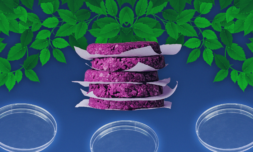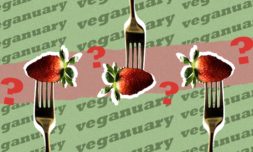Why so many people are ditching dairy
Aside from those who suffer from lactose intolerance, many people have abandoned dairy milk because of the way it is produced.
To obtain milk from female cows, day old calves are abruptly separated from their mothers and fed milk replacers, with their mothers’ milk being sold to humans. This has led PETA to label cow’s milk a ‘cruel and unhealthy product.’
It is also now common knowledge that dairy farms – especially industrial sized farms – are terrible for the environment, being globally responsible for 50 billion tons of carbon emission each year.
But just because soy, almond, and oat milks don’t interfere directly with the lives of animals, there are still serious questions being asked about which plant-based products can be adequately deemed as ‘better for the planet’.
The environmental impact of plant-based milks
In order to satisfy a growing demand for dairy-milk alternatives, large amounts of land has had to be freed up for farming.
Soy milk, which has a relatively good rating in terms of CO2 emissions and water use, has been identified as major contributor to deforestation in the Amazon, where companies have used the rainforest’s lush soils for growing soybean plants.
As you may already know, clearing rainforests releases vast amounts of carbon into the atmosphere and causes destruction to important ecosystems. So at the end, soy milk has become an unfavourable candidate for sustainability.
Almond milk has a low carbon footprint, too, but its plants require a lot of water to grow. To make a single glass of the stuff, a whopping 120 litres are needed.
Since a wide majority of almond milk products source their almonds from California where long periods of drought and water shortages are a constant issue, this nutty alternative has also been ruled out by many environmentalists.
At present, oat milk has been championed as the most sustainable plant-based drink. Although it does produce slightly more CO2 than its aforementioned competitors, overall, oat milk needs less water and less land to make it into our morning cuppa.
So where does potato milk stand?
A new, Swedish potato milk company called DUG has said that growing potatoes uses half as much land as oats and 56 percent less land than needed for almond milk.
Not to mention, potatoes have the ability to grow in almost every corner of the world with only little need for water. But potato milk overtakes the current oat king in one key way: it uses significantly less carbon to produce – just 0.27kg per litre.
As far as taste goes… well, I haven’t tried it myself. But word on the Internet is that it doesn’t taste like potatoes at all. Apparently, it’s ‘very creamy and very fatty in a good way,’ especially the barista versions.
Some vegan bloggers say it tastes like ‘muted hemp milk, with that pancake batter-like aftertaste.’ Pancake lovers rejoice, then. Others say it’s ‘surprisingly subtle and a little sweet – perfect for hot drinks, cereal, or baked goods.’
The only downside is that some versions do split in tea and coffee, which doesn’t change the taste, but does look a little funky inside a mug. This is something companies joining the potato milk hype will need to resolve in order to win the hearts (and taste buds) of many consumers.
All in all, DUG potato milk sounds like it’s got a lot going for it, with its low maintenance growing needs and the smallest carbon footprint of all its plant-based brothers and sisters.
I mean, if you had told me I’d be drinking milk from an oat back in 2005 I’d probably have looked at you sideways. But our society has learned to become quite culinarily adventurous in the name of sustainability and honestly, I don’t know who I’d be without Ms. Oat in my life these days.
If DUG’s range is the next big thing in the dairy alternative industry, then hey, I’m willing to give it a shot. Coffee with potato milk, anyone?





















